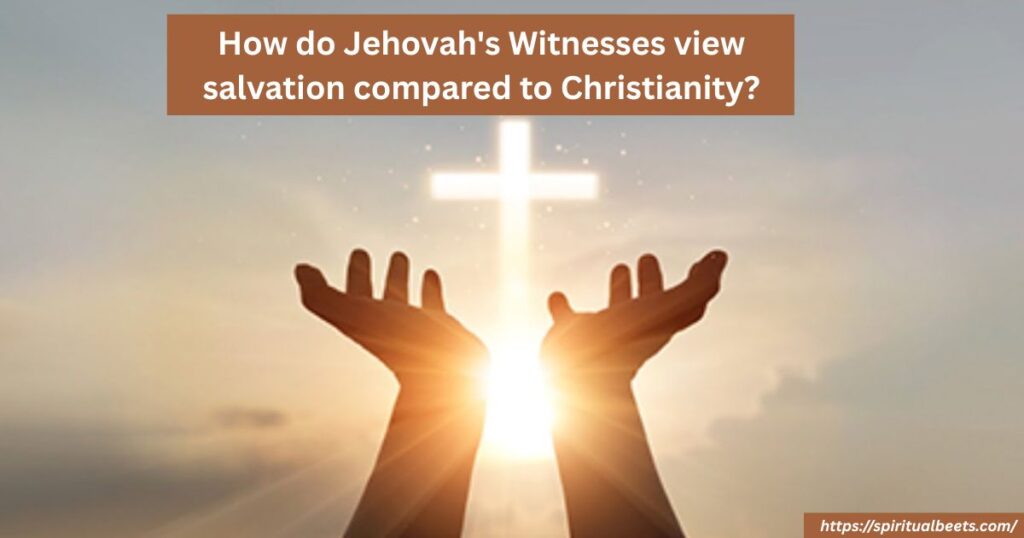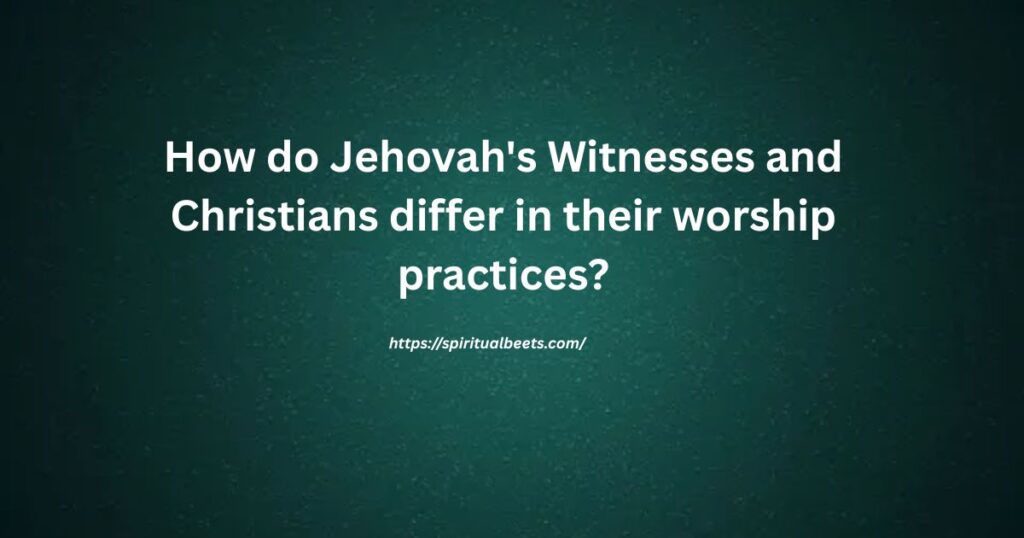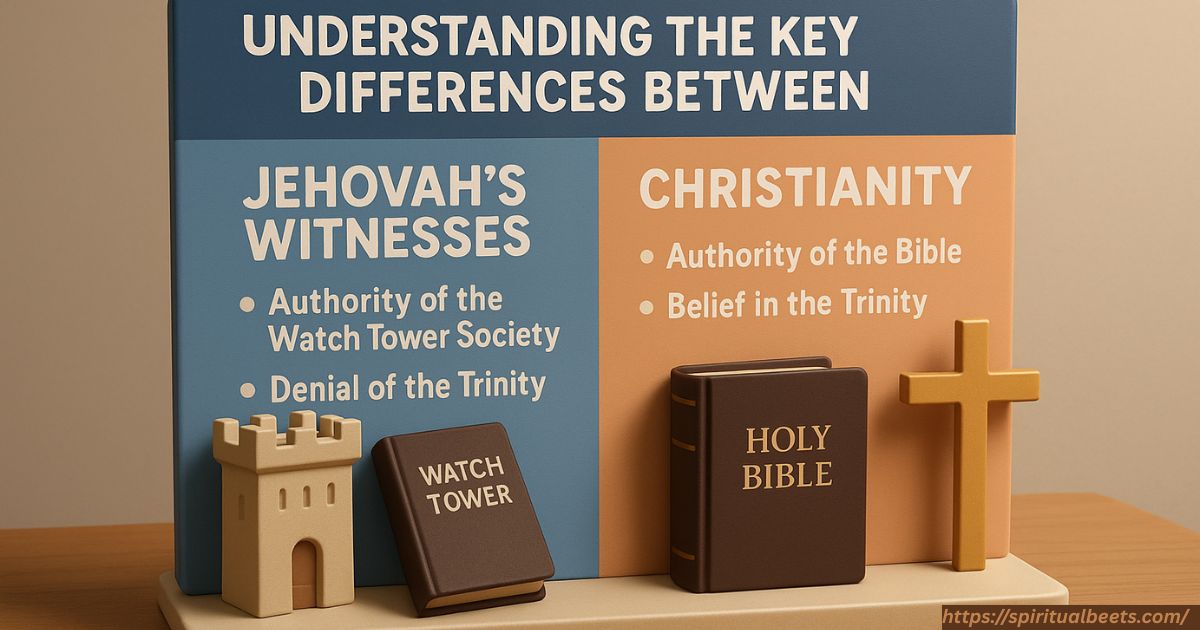Jehovah’s Witnesses and Christianity share some common roots. Both believe in the Bible and follow Jesus Christ. But their beliefs are very different. Jehovah’s Witnesses reject the Trinity and celebrate no religious holidays. Christians believe in the Trinity and honor holidays like Christmas and Easter. These key differences shape how each group lives and worships.
They may seem similar at first. Both read the Bible and speak about Jesus. But their beliefs are very different in key areas. These include how they view God, salvation and the end times. Their worship practices also set them apart. Learning these differences helps bring clarity and understanding.
What are the core beliefs of Jehovah’s Witnesses and how do they differ from Christianity?
Jehovah’s Witnesses believe in one God, Jehovah. They do not believe in the Trinity. They see Jesus as God’s first creation, not equal to God. They use their own Bible, the New World Translation. Their beliefs focus on obedience and good works. They also reject common Christian holidays.
Christianity teaches that God is three in one , Father, Son and Holy Spirit. Christians believe Jesus is fully God and fully man. Salvation is a gift, not earned by works. Most use common Bible translations like ESV or NIV. Christians celebrate holidays like Christmas and Easter. They believe in grace through faith.
- Trinity vs. single God belief
- Jesus as God vs. created being
- Grace vs. works-based salvation
- Common Bible vs. New World Translation
- Celebrating holidays vs. rejecting them
- Worship style and doctrine differ
Read Also: Yeshua Hamashiach: Messiah’s Role In Biblical Truth
How do Jehovah’s Witnesses view salvation compared to Christianity?
Jehovah’s Witnesses believe salvation must be earned. They think people must do good works to please God. This includes preaching, attending meetings and obeying rules. They do not believe salvation comes by grace alone. To them, faith must be shown through actions. Only those who stay faithful to their teachings will be saved.

Christianity teaches that salvation is a free gift. It comes by God’s grace through faith in Jesus Christ. Good works are a result of faith, not a way to earn salvation. Christians believe Jesus died to pay for all sin. Trusting in Him brings eternal life. This view is based on Bible verses like Ephesians 2:8–9.
- Jehovah’s Witnesses: salvation through faith and works
- Christians: salvation through faith alone
- Witnesses reject the idea of grace without works
- Christians see grace as the only way to be saved
- Witnesses must follow strict rules to be saved
- Christians believe Jesus fully paid the price for sin
Read Also: Biblical Meaning Of Dreaming Of Deceased Mother
How do Jehovah’s Witnesses and Christians differ in their views on the end times and the afterlife?
Jehovah’s Witnesses believe the end times began in 1914. They teach that Jesus returned invisibly that year. They believe only 144,000 people will go to heaven. The rest of the faithful will live forever on a paradise Earth. They do not believe in eternal hellfire. They see death as a deep sleep with no awareness.
Christians believe Jesus will return visibly in the future. All people will be judged at that time. Believers will go to heaven to be with God forever. Unbelievers will be separated from God in hell. They believe the soul is eternal. The afterlife depends on faith in Jesus.
- Jehovah’s Witnesses: invisible return in 1914
- Christians: future visible return
- Jehovah’s Witnesses: only 144,000 in heaven
- Christians: all true believers in heaven
- Jehovah’s Witnesses: no eternal hell
- Christians: eternal heaven or hell after judgment
Read Also: Unlocking The Mysteries Of Killer Whale Dreams Meanings
How do Jehovah’s Witnesses and Christians differ in their worship practices?
Jehovah’s Witnesses have unique worship practices. They meet in Kingdom Halls, not traditional churches. They do not celebrate Christmas, Easter, or birthdays. They avoid political events and do not salute flags. Their focus is on Bible study and door-to-door preaching. They believe these actions show loyalty to God.

Christians worship in many different ways. Most meet in churches and celebrate major religious holidays. They may take part in political and civic duties. Christians often include music, prayer and sermons in worship. Many practice sacraments like baptism and communion. Their worship reflects faith in Jesus and church traditions.
- Jehovah’s Witnesses avoid holidays. Christians celebrate them
- Jehovah’s Witnesses meet in Kingdom Halls. Christians meet in churches
- Jehovah’s Witnesses preach door-to-door. Christians use varied outreach methods
- Jehovah’s Witnesses avoid politics. Christians may participate
- Christians use music and sacraments. Witnesses focus on Bible study
- Christian worship varies by denomination. Witness worship is more uniform
Read Also: Dream About Stabbing Someone
How do Jehovah’s Witnesses and Christians differ in their understanding of Jesus Christ?
Jehovah’s Witnesses believe Jesus is God’s first creation. They see Him as separate from Jehovah. To them, Jesus is not God but a perfect man. They also believe He is the archangel Michael. Jesus came to Earth to give His life as a ransom. But He is not worshipped as God.
Christians believe Jesus is the Son of God. He is fully God and fully man. They believe He is part of the Holy Trinity. Jesus is eternal and not created. He died for the sins of the world and rose again. Christians worship Jesus as Lord and Savior.
- Jehovah’s Witnesses: Jesus is created and not God.
- Christians: Jesus is divine and eternal.
- Jehovah’s Witnesses: Jesus is the archangel Michael.
- Christians: Jesus is the Son of God and part of the Trinity.
- Jehovah’s Witnesses: Do not worship Jesus as God.
- Christians: Worship Jesus as Lord and Savior.
How do Jehovah’s Witnesses and Christians differ in their evangelism and outreach efforts?
Jehovah’s Witnesses follow a strict and organized method of evangelism. They go door to door to share their message. They hand out literature like The Watchtower and Awake magazines. Their outreach is done regularly and with training. Members are expected to report their preaching hours. This method is part of their daily life and spiritual duty.

Christians also believe in sharing their faith. But their methods are more flexible and varied. Some use personal conversations or community events. Others join mission trips or church outreach programs. Evangelism can be casual or formal, depending on the church. Many focus on building relationships first.
- Jehovah’s Witnesses use door-to-door preaching.
- Christians may use personal or public methods.
- Jehovah’s Witnesses follow a set schedule and report efforts.
- Christian outreach styles depend on the church or denomination.
- Jehovah’s Witnesses use printed magazines widely.
- Christians often rely on personal stories and local missions.
Frequently Asked Questions
How do Jehovah’s Witnesses differ from Christians?
Jehovah’s Witnesses reject the Trinity and have different beliefs from Christians.
What do Jehovah’s Witnesses believe that Christians do not?
Jehovah’s Witnesses believe Jesus is created, not God.
Are Jehovah’s Witnesses a part of Christianity?
Jehovah’s Witnesses are not part of mainstream Christianity.
What is the one question Jehovah’s Witnesses cannot answer?
Why their end-time predictions have failed.
Why don’t Jehovah’s celebrate birthdays?
Jehovah’s Witnesses avoid birthdays for pagan and non-biblical reasons.
Conclusion
Jehovah’s Witnesses and Christians have many differences. They see God, Jesus and the Bible in unique ways. Their beliefs about salvation are not the same. Worship practices also differ a lot. Jehovah’s Witnesses avoid holidays and stay neutral in politics. Christians often celebrate holidays and take part in civic life. These beliefs shape how each group lives and shares their faith.
Both groups care deeply about their beliefs. Jehovah’s Witnesses follow strict rules and preach door to door. Christians share their faith in many ways. Each path is based on their view of the Bible. Understanding these views helps avoid confusion. It also builds respect for different beliefs. Learning these differences brings clarity and peace.
I have three years of professional experience writing articles about spiritual meaning, symbolism and metaphysical concepts. My expertise includes interpreting symbolic themes in religious texts, cultural traditions and personal experiences explaining abstract spiritual concepts through accessible analogies and real world examples and creating content that resonates with diverse audiences seeking deeper understanding of life’s purpose and universal truths. I specialize in crafting articles that balance intellectual rigor with emotional resonance, often incorporating elements of philosophy, psychology and cultural studies to help readers connect spiritual principles to practical life applications.




